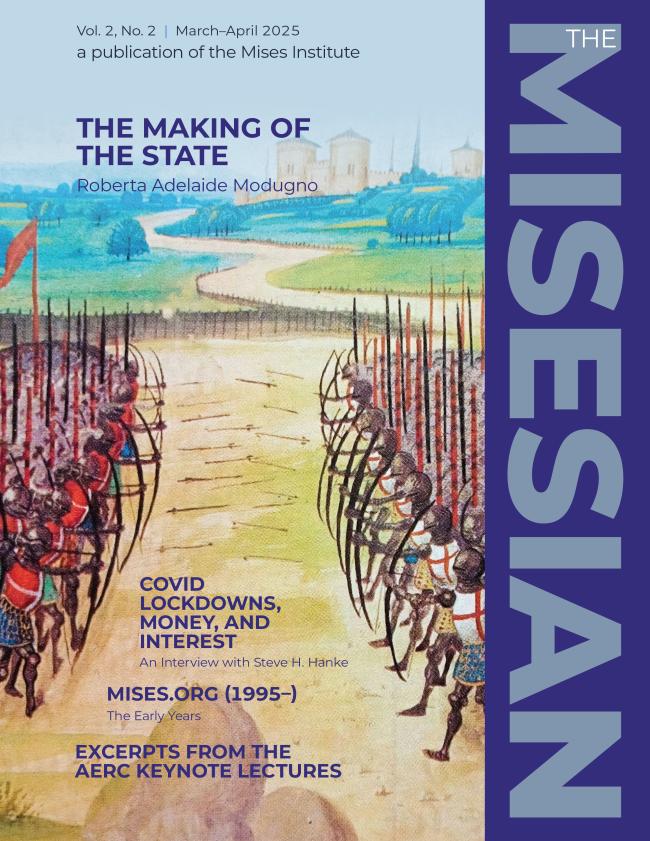- Downloads:
- TM March April final.pdf
One of the most popular essays we’ve ever published at the Mises Institute is Murray Rothbard’s “Anatomy of the State.” It’s a great and succinct introduction to the institution that we now call “the state” and explains how the state is a unique type of governance built on coercion and war. Perhaps most importantly, Rothbard explains why the state is not synonymous with society, with the nation, or with any private or voluntary group of individuals. Rothbard drew on the ideas of German sociologist Franz Oppenheimer, who had illustrated the important distinction between voluntary organization— such as markets—and organization built on coercion and theft—such as states.
Originally published in 1974, Rothbard’s essay reflected scholars’ growing interest in the origins and nature of the state. A year after Rothbard’s essay was published, Charles Tilly published his influential book The Formation of National States in Western Europe (1975). Over the next 20 years, many other scholars would explore the topic in their own volumes, including Gianfranco Poggi in The State: Its Nature, Development and Prospects (1990), Hendrik Spruyt in The Sovereign State and Its Competitors: An Analysis of Systems Change (1994), and Martin van Creveld in The Rise and Decline of the State (1999).
Central to all this scholarship has been the fact that the state’s peculiar type of political rule arose in a specific time and place. This leads us to an important conclusion; namely, that there is nothing natural about the state, and that it is not necessary for human development or governance.
It remains important that advocates of freedom and free markets continue to publish scholarship that builds on this truly libertarian, or laissez-faire, view of the state. This, of course, was what Rothbard was doing with “Anatomy of the State,” and we are fortunate to include in this issue of The Misesian a new essay from historian and political scientist Roberta Adelaide Modugno that does precisely this. In “The Making of the State,” Professor Modugno shows that even as the state was coming into being, historians and scholars understood that it was something new and different, and she examines a broad array of commentary from observers spanning the sixteenth century to the present day. A lesson we learn from all of this is that the state is central to what we now call “modernity,” which is in many ways defined by the overwhelming power of states.

From the Editor—March / April 2025
The state is not necessary for human development or governance. It is important that advocates of freedom and free markets publish scholarship that builds on this truly libertarian, or laissez-faire, view of the state. In this issue of The Misesian, Roberta Modugno does just that.
The Making of the State
In “The Making of the State,” Prof. Modugno shows that even as the state was coming into being, historians and scholars understood that it was something new and different and that the state is central to what we now call “modernity,” which is defined by the overwhelming power of states.
Covid Lockdowns, Money, and Interest: An Interview with Steve H. Hanke
The covid-19 pandemic gave rise to widespread lockdowns and some of the greatest peacetime infringements on personal liberties in history.
Planet of the Abes
Prophetic Statesmanship is worth reading as an example of the misplaced ingenuity with which intelligent scholars can defend ridiculous views. Efforts to unify Americans in the worship of the godlike Abraham Lincoln cannot succeed.
Excerpts from the Keynote Lectures at AERC
Excerpts from the 2025 Memorial Lectures presented at the Austrian Economics Research Conference in Auburn, Alabama.
mises.org (1995–): The Early Years
This year marks the 30th anniversary of the founding of mises.org. In 1995, as soon as it became possible to purchase domain names and contract with private servers, we snapped up “mises.org,” and the rest is history.
Scholar Spotlight—Jason Jewell
Jason Jewell is chief academic officer and vice chancellor for strategic initiatives of the State University System of Florida. He began attending Mises Institute events as a graduate student in 2002.








